By Ginger Gibson
WASHINGTON (Reuters) - The largest lobbying organization for pharmaceutical companies began running TV ads on Monday morning to improve the industry's image as criticism from U.S. President Donald Trump increases.
The industry is touting developments in science by pharmaceutical companies and will spend "tens of millions" on television commercials, according to an announcement on Monday by officials of lobbying group PHRMA. A spokesman did not provide a specific amount.
Pharmaceutical companies may be facing their most difficult time ahead as criticism about the price of drugs continues to increase. In a news conference this month, Trump said drug manufacturers were "getting away with murder" because of their pricing.
Additionally, drug manufacturers were considered winners when the Affordable Care Act became law because more people had increased access to prescriptions. A repeal of the law often known as Obamacare could mean many people losing insurance could not afford to purchase drugs.
PHRMA CEO Stephen Ubl cast the "Go Boldly" campaign as an effort to refocus the discussion about the strides in research. But he acknowledged the industry was at the center of criticism.
"We take the concerns that have been raised by the president very seriously," Ubl said. "We think there are pragmatic policy solutions, and we look forward to working with the administration."
While outspoken while the Affordable Care Act was being drafted, PHRMA has largely remained quiet during the early discussions about whether the law should be repealed and replaced.
Planning for the group's campaign began six months ago, well before the November presidential election, according to spokesman Robert Zirkelbach.
Like many organizations, the group signaled it expected Democrat Hillary Clinton was going to win and began planning to push back at her calls for capping drug prices.
It continued with plans for the campaign, which Ubl said would have been the same had Clinton won, even after Trump was elected.
The group also released a four-part regulatory and legislative agenda that it said would be part of an extensive lobbying campaign, including advocating for changes to the Food and Drug Administration and the ability for drugmakers to coordinate with insurance companies when developing new treatments.
The campaign makes almost no mention of the repeal of Obamacare.

"(This campaign) is not aimed at any one legislative issue," Ubl said.